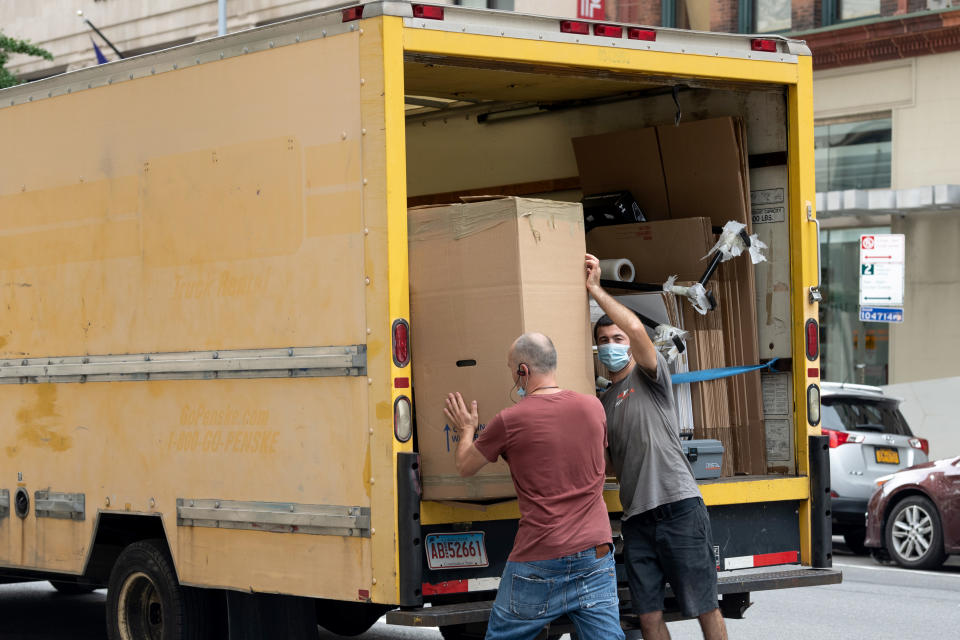Expert: 4 questions you should answer before relocating amid the pandemic
The pandemic has sent young urbanites packing and headed for greener pastures.
The fantasy of owning a weekend retreat or leaving the city once and for all is a reality for millennials whose eventual plans to leave cities were accelerated by COVID-19’s shelter-in-place measures and the move to remote work indefinitely.
Nearly 3 out of 10 millennials have revisited their financial plans and made significant adjustments since March, more than any other generation, according to a recent study by Northwestern Mutual.
“This COVID circumstance has forced people to think about what they want and slow down a little bit, which is a good thing,” Chantel Bonneau, a Northwestern Mutual wealth management advisor, said. “Many of us are working so hard and are so busy that this is making people stop and say: ‘Okay, where do I want to live? Do I want to buy a house?’”

Metro hubs may have lost some of their luster to urbanites whose jobs no longer ground them and they’re re-evaluating why they’ve committed themselves to a particular location. Maybe the expensive cost of living is no longer justified.
The allure of the suburban sprawl and connectivity to nature is also appealing for growing families who’ve felt cramped after six months of uninterrupted life indoors.
“This experience, I think, has made people very jealous of suburban life,” Bonneau said, “and realizing that maybe if I spend more time at home, it makes more sense to invest in space and the convenience of commuting is less imperative.”
Before relocating, Bonneau offered advice to those considering the major financial decision and lifestyle upheaval and emphasizes that people should be “as clear as possible on the likelihood of your ability to work from a distance, based on your company and occupation for the long term.”
What will life look like when the pandemic passes?

In the absence of commuting and a robust social events calendar, the days of quarantine have felt like they’ve moved at glacial pace. It’s a natural desire to want to shake up the monotony of working from home with a change of scenery.
Bonneau suggested asking yourself: “How will this decision impact you if you do return to work as you did before?”
If you eventually return to a physical office, will you still be able to access your second home that’s a great distance away from your primary home? If your home is in a hot spot for short-term vacation rentals, decide if you want to rent it for additional income.
If you traded city life for the suburbs, but you might be called upon to return to the city, your daily commute will be substantially longer. Perhaps you can work on a schedule where you’re not commuting five days a week to make your longer commute bearable in exchange for what you gained in space.
How much of a financial sacrifice are you willing to make?

If buying a second home or moving to the suburbs means that your cash reserve will be depleted, are you comfortable with the fact, especially if it means delaying your other financial goals?
If your work routine returns to what it was pre-pandemic and you now want to buy the condo in the city, but you spent your money on a second property, are you okay with that?
“Make sure that doesn't prevent you from the other goals in your life, like saving for retirement or buying the primary house you want,” she said.
Decide from a ‘place of information’
Financial decisions are predicated on employment and best made from “a place of information versus emotion,” Bonneau said. Look at your company and assess if profits are rising or falling, and what that means for your future employment there. If the current climate continues for another six months or a year, what will that do to your employer’s business, and will it put you out of work?

If your employer isn’t a public company, then its financials won’t be disclosed, but you can assess anecdotally. Have there been recent layoffs? Are bonuses a thing of the past? Does a conference room potluck now replace what was once a holiday bash? It could mean that the company is trying to cut costs, but you might not be privy to the degree or severity.
If the signs are around you that your employer isn’t strong, it might not be a great time to spend a large portion of your savings.
‘Don’t get caught up in the frenzy’
Leaving the city or buying a vacation home should be decided with care and not because of a trend.
“Don't get caught up in the frenzy,” Bonneau said, explaining that COVID-19 has served as a catalyst for families in need of more space to accelerate their plans to move into that bigger home in an area with a lower cost of living.
“There's a difference between making a rash decision because in the very short term you want somewhere to go,” Bonneau said, “versus if you know deep down that you were planning to make a suburban move and this has maybe just sped that up a year.”.
Stephanie is a reporter for Yahoo Money and Cashay, a new personal finance website. She can be reached at stephanie.asymkos@yahoofinance.com. Follow her on Twitter @SJAsymkos.
Read more information and tips in our Housing section






